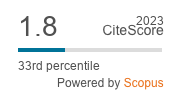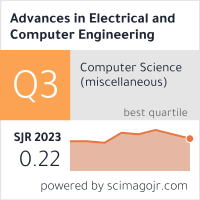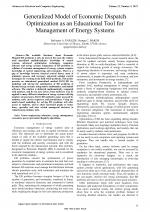| 2/2021 - 9 |
Generalized Model of Economic Dispatch Optimization as an Educational Tool for Management of Energy SystemsPAPAZIS, S. A. |
| Extra paper information in |
| Click to see author's profile in |
| Download PDF |
Author keywords
engineering education, energy management, economics, power generation dispatch, algorithms
References keywords
power(31), economic(31), dispatch(30), systems(22), optimization(13), tpwrs(10), swarm(10), energy(9), education(7), dynamic(7)
Blue keywords are present in both the references section and the paper title.
About this article
Date of Publication: 2021-05-31
Volume 21, Issue 2, Year 2021, On page(s): 75 - 86
ISSN: 1582-7445, e-ISSN: 1844-7600
Digital Object Identifier: 10.4316/AECE.2021.02009
Web of Science Accession Number: 000657126200009
SCOPUS ID: 85107673351
Abstract
The available literature about Economic Dispatch ED problems is rich. In most of the cases the readers need specialized multidisciplinary knowledge of control systems, advanced optimization techniques, computers software and energy systems. Integration of ED problems in syllabus of economic management of energy systems requires knowledge of control engineering, and economics. There is a gap of knowledge between classical control theory most of graduates possess, and necessary advanced optimal control techniques for working in the field of ED problems. This article presents an educational generalized method EGM_ED for modeling, and solving the optimization of ED problems of thermal energy systems, using matrix mathematics, and matlab software. The solution is deducted mathematically, computed with matrices, and do not uses solvers from toolboxes. Can be applied in many different situations of energy systems with big numbers of generators. EGM_ED method is easier accessed by students, early carrier engineers, and practitioners. Using our matrix-based modelling for solving ED problems will offer access to students, and to other interested people to better learn, specialize and take critical managerial decisions in related energy industry jobs. |
| References | | | Cited By «-- Click to see who has cited this paper |
| [1] A. J. Conejo, L. Baringo, "Power system operations," Springer International Publishing AG, pp. 197-216, 2018. [CrossRef] [Web of Science Times Cited 6] [2] G. C. Bakos, Energy economics, Editions Democritus University of Thrace, Greece, 2004 [3] A.J. Wood, B. F. Wollenbeg, Power Generation, operation and control, Wiley, pp. 29-43, 1996 [4] W. T. Elsayed, E. F. El-Saadany, "A fully decentralized approach for solving the economic dispatch problem," IEEE Trans. Power Systems, vol. 30, no. 4, pp. 2179-2189, July 2015. [CrossRef] [Web of Science Times Cited 117] [SCOPUS Times Cited 135] [5] V. Vlad, C. D. Popa, A. Graur, R. D. Pentiuc, "Concepts and models for design and simulation of distributed control systems for future power grid," Proc. 16th International Conference on Harmonics and Quality of Power (ICHQP), Bucharest, 2014, pp. 444-447. [CrossRef] [SCOPUS Times Cited 3] [6] G. C. Bakos, "Feasibility study of a hybrid wind/hydro power-system for low-cost electricity production," Applied Energy, vol. 72, iss. 3-4, pp. 599-608, 2002. [CrossRef] [Web of Science Times Cited 90] [SCOPUS Times Cited 110] [7] F. Martell, E. Torres, "Improving learning on economic analysis of energy efficiency projects by using comparative cost analysis and measuring and verification methodology," Proc. 2017 IEEE World Engineering Education Conference EDUNINE, Santos, Brazil, pp. 57-60, 19-22 March 2017. [CrossRef] [SCOPUS Times Cited 2] [8] S. A. Papazis, M. G. Ioannides, P. N. Fotilas, "An information system for multiple criteria assessment of renewable energy power plants," Wind Engineering, Sage Publishing, vol. 24, No. 2, 2000, pp.81-99. [CrossRef] [SCOPUS Times Cited 8] [9] A. S. Leger, "A multidisciplinary undergraduate alternative energy engineering course," IEEE Trans Education, pp. 1-6, June 2018. [CrossRef] [Web of Science Times Cited 9] [SCOPUS Times Cited 13] [10] S. Mengual-Andres, R. Roig-Vila, J. B. Mira, "Delphi study for the design and validation of a questionnaire about digital competences in higher education," Int. J. Educational Technology in Higher Education, vol. 13, Issue 1, Art. 12, 2016. [CrossRef] [Web of Science Times Cited 84] [SCOPUS Times Cited 87] [11] M. G. Ioannides, S. A. Papazis, "Development of new curricula in vocational education for the needs of enterprises and employability of graduates," International Conference Information Technology Based Higher Education and Training ITHET, Istanbul, 2016, pp. 1-5. [CrossRef] [SCOPUS Times Cited 6] [12] S. Schefer-Wenzl, I. Miladinovic, "Developing complex problem-solving skills: an engineering perspective," Int. J. Advanced Corporate Learning iJAC, vol. 12, No. 3, 2019. [CrossRef] [13] R. Klaassen, P. de Vries, M. G. Ioannides, S. A. Papazis, "Tipping your toe in the 'Emerging Technologies' pond from an educational point of view," Annual Conference 2017- Education Excellence for Sustainability, SEFI 2017, 18-21 September 2017, Azores, Portugal, pp. 1190-1197. [14] R. Petrovic, "Economic dispatching in power systems using optimal control theory," in S. G. Tzafestas Ed., "Optimization and control of dynamic operational research models", vol. 4, North-Holland Publishing, Amsterdam, 1982, pp. 217-250 [15] D. O. Dike, M. I. Adinfono, G. Ogu, "Economic dispatch of generated power using modified Lambda-Iteration method," IOSR J Electrical and Electronics Engineering IOSR-JEEE, vol. 7, Issue 1, pp. 49-54, July-Aug. 2013. [CrossRef] [16] X. S. Han, H. B. Gooi, "Effective economic dispatch model and algorithm," Electrical Power and Energy Systems, vol. 29, pp. 113-120, 2007. [CrossRef] [Web of Science Times Cited 43] [SCOPUS Times Cited 52] [17] J. P. Zhan, Q. H. Wu, C. X. Guo, X. X. Zhou, "Fast λ-Iteration method for economic dispatch with prohibited operating zones", IEEE Trans. Power Systems, vol. 29, No. 2, pp. 990-991, March 2014. [CrossRef] [Web of Science Times Cited 75] [SCOPUS Times Cited 102] [18] N. Sinha, R. Chakrabarti, P. K. Chattopadhyay, "Evolutionary programming techniques for economic load dispatch," IEEE Trans. Evolutionary Computation, vol. 7, no. 1, pp. 83-94, Feb. 2003. [CrossRef] [Web of Science Times Cited 861] [SCOPUS Times Cited 1147] [19] T. N. Malik, A. ul Asar, M. F. Wyne, S. Akhtar, "A new hybrid approach for the solution of nonconvex economic dispatch problem with valve-point effects," Electric Power Systems Research, vol. 80, no. 9, pp. 1128-1136, 2010. [CrossRef] [Web of Science Times Cited 57] [SCOPUS Times Cited 93] [20] B. Mohammadi-Ivatloo, A. Rabiee, A. Soroudi, "Nonconvex dynamic economic power dispatch problems solution using hybrid immune-genetic algorithm," IEEE Systems J., vol. 7, no. 4, pp. 777-785, Dec. 2013. [CrossRef] [Web of Science Times Cited 67] [SCOPUS Times Cited 82] [21] B. Lu, M. Shahidehpour, "Short-Term Scheduling of Combined Cycle Units," IEEE Trans. Power Systems, vol. 19, no. 3, pp. 1616-1625, Aug. 2004. [CrossRef] [Web of Science Times Cited 74] [SCOPUS Times Cited 91] [22] L. Bayon, P. J. Garcia Nieto, J. M. Grau, M. M. Ruiz, P. M. Suarez, "An economic dispatch algorithm of combined cycle units," Int. J. Computer Mathematics, vol. 91, No. 2, pp. 269-277, 2014. [CrossRef] [Web of Science Times Cited 6] [SCOPUS Times Cited 7] [23] C. Liu, M. Shahidehpour, Z. Li, M. Fotuhi- Firuzabad, "Component and mode models for the short-term scheduling of combined-cycle units," IEEE Trans. Power Systems, vol. 24, no. 2, pp. 976-990, May 2009. [CrossRef] [Web of Science Times Cited 75] [SCOPUS Times Cited 90] [24] G. B. Sheble, "Real-time economic dispatch and reserve allocation using merit order loading and linear programming rules," IEEE Trans. Power Systems, vol. 4, no. 4, pp. 1414-1420, November 1989. [CrossRef] [Web of Science Times Cited 30] [SCOPUS Times Cited 41] [25] W. Ongsakul, "Real-time economic dispatch using merit order loading for linear decreasing and staircase incremental cost functions," Electric Power Systems Research, vol.51, pp.167-173, 1999. [CrossRef] [Web of Science Times Cited 16] [SCOPUS Times Cited 17] [26] G. Chen, C. Li, Z. Dong, "Parallel and distributed computation for dynamical economic dispatch," IEEE Trans. Smart Grid, vol. 8, no. 2, pp. 1026-1027, March 2017. [CrossRef] [Web of Science Times Cited 55] [SCOPUS Times Cited 59] [27] M. Q. Wang, H. B. Gooi, S. X. Chen, S. Lu, "A mixed integer quadratic programming for dynamic economic dispatch with valve point effect," IEEE Trans. Power Systems, vol. 29, no. 5, pp. 2097-2106, September 2014. [CrossRef] [Web of Science Times Cited 82] [SCOPUS Times Cited 105] [28] C. Lin, W. Wu, X. Chen, W. Zheng, "Decentralized dynamic economic dispatch for integrated transmission and active distribution networks using multi-parametric programming," IEEE Trans. Smart Grid, vol. 9, no. 5, pp. 4983-4993, September 2018. [CrossRef] [Web of Science Times Cited 103] [SCOPUS Times Cited 100] [29] T. Ding, Z. Bie, "Parallel augmented Lagrangian relaxation for dynamic economic dispatch using diagonal quadratic approximation method," IEEE Trans. Power Systems, vol. 32, no. 2, pp.1115-1126, March 2017. [CrossRef] [Web of Science Times Cited 46] [SCOPUS Times Cited 53] [30] Z. Li, W. Wu, B. Zhang, H. Sun, Q. Guo, "Dynamic economic dispatch using Lagrangian relaxation with multiplier updates based on a quasi-newton method," IEEE Trans. Power Systems, vol. 28, no. 4, pp. 4516-4527, November 2013. [CrossRef] [Web of Science Times Cited 84] [SCOPUS Times Cited 114] [31] D. Cai, E. Mallada, A. Wierman, "Distributed optimization decomposition for joint economic dispatch and frequency regulation," IEEE Trans. Power Systems, vol. 32, no. 6, pp. 4370-4385, Nov. 2017. [CrossRef] [SCOPUS Times Cited 43] [32] G. B. Sheble, K. Brittig, "Refined genetic algorithm economic dispatch example," IEEE Trans. Power Systems, vol. 10, Issue 1, pp. 117-124, Feb. 1995. [CrossRef] [Web of Science Times Cited 158] [SCOPUS Times Cited 246] [33] C. A. C. Coello, "Theoretical and numerical constraint-handling techniques used with evolutionary algorithms: A survey of the state of the art," Computer Methods in Applied Mechanics and Engineering, vol. 191, pp. 1245-1287, January 2002 [34] H. Yang, P. Yang, C. Huang, "Evolutionary programming based economic dispatch for units with non-smooth fuel cost functions," IEEE Trans. Power Systems, vol. 11, no.1, pp. 112-118, February 1996. [CrossRef] [Web of Science Times Cited 343] [SCOPUS Times Cited 486] [35] M. H. R. Nascimento, J. de Almeida Brito Junior, C. A. O. de Freitas, N. M. Moraes, J. C. Leite, "Analysis of the solution for the economic load dispatch by different mathematical methods and genetic algorithms: Case Study," Journal Engineering Technology Industrial Applications, Ed. 15, vol. 4, 2018. [CrossRef] [36] G. Abbas, J. Gu, U. Farooq, M. U. Asad, M. E. El-Hawary, "Solution of an economic dispatch problem through particle swarm optimization: A detailed survey. Part I," IEEE Access, vol. 5, pp. 15105-15141, 2017. [CrossRef] [Web of Science Times Cited 78] [SCOPUS Times Cited 98] [37] G. Abbas, J. Gu, U. Farooq, A. Raza, M. U. Asad, M. E. El-Hawary, "Solution of an economic dispatch problem through particle swarm optimization: A detailed survey. Part II," IEEE Access, vol. 5, pp. 24426-24445, 2017. [CrossRef] [Web of Science Times Cited 48] [SCOPUS Times Cited 57] [38] J. Park, K. Lee, J. Shin, K. Y. Lee, "A particle swarm optimization for economic dispatch with non-smooth cost functions," IEEE Trans. Power Systems, vol. 20, pp. 34-42, February 2005. [CrossRef] [Web of Science Times Cited 724] [SCOPUS Times Cited 1024] [39] F. Gao, G. B. Sheble, "Stochastic optimization techniques for economic dispatch with combined cycle units," 9th International Conference on Probabilistic Methods Applied to Power Systems, Stockholm, Sweden, pp. 1-8, June 11-15, 2006. [CrossRef] [SCOPUS Times Cited 6] [40] K. T. Chaturvedi, M. Pandit, L. Srivastava, "Self-organizing hierarchical particle swarm optimization for nonconvex economic dispatch," IEEE Trans. Power Systems, vol. 23, no. 3, pp. 1079-1087, August 2008. [CrossRef] [Web of Science Times Cited 341] [SCOPUS Times Cited 419] [41] B. K. Panigrahi, V. R. Pandi, S. Das, "Adaptive particle swarm optimization approach for static and dynamic economic load dispatch," Energy Conversion and Management, vol.49, no.6, pp. 1407-1415, 2008. [CrossRef] [Web of Science Times Cited 263] [SCOPUS Times Cited 325] [42] E. Mezura-Montes, C. A. Coello-Coello, "Constraint-handling in nature-inspired numerical optimization: Past, present and future," Swarm and Evolutionary Computation, vol. 1, no. 4, pp.173-194, 2011. [CrossRef] [Web of Science Times Cited 792] [SCOPUS Times Cited 915] [43] M. Basu, "Modified particle swarm optimization for nonconvex economic dispatch problems," International Journal of Electrical Power and Energy Systems, vol. 69, pp. 304-312, July 2015. [CrossRef] [Web of Science Times Cited 77] [SCOPUS Times Cited 101] [44] W. T. Elsayed, Y. G. Hegazy, M. S. El-Bages, F. M. Bendary, "Improved random drift particle swarm optimization with self-adaptive mechanism for solving the power economic dispatch problem," IEEE Trans. Industrial Informatics, vol. 13, no. 3, pp. 1017-1026, June 2017. [CrossRef] [Web of Science Times Cited 79] [SCOPUS Times Cited 97] [45] M. Pandit, L. Srivastava, M. Sharma, H. M. Dubey, B. K. Panigrahi, "Large-scale multi-zone optimal power dispatch using hybrid hierarchical evolution technique," The Journal of Engineering, vol. 2014, no. 3, pp. 71-80, 3 2014. [CrossRef] [Web of Science Times Cited 18] [46] H. Zapata, N. Peroso, W. Angulo, J. Contreras, "A hybrid swarm algorithm for collective construction of 3D structures," International Journal of Artificial Intelligence, IJAI, vol. 18, no. 1, 2020, pp. 1-18 [47] R.-E. Precup, R.-C. David, E. M. Petriu, A.-I. Szedlak-Stinean, C.-A. Bojan-Dragos, "Grey wolf optimizer-based approach to the tuning of PI-fuzzy controllers with a reduced process parametric sensitivity," IFAC-PapersOnLine, vol. 49, no. 5, pp. 55-60, 2016. [CrossRef] [Web of Science Times Cited 82] [SCOPUS Times Cited 99] [48] M. Pradhan, P. K. Roy, T. Pal, "Grey wolf optimization applied to economic load dispatch problems," International Journal of Electrical Power and Energy Systems, vol. 83, pp. 325_334, Dec. 2016. [CrossRef] [Web of Science Times Cited 185] [SCOPUS Times Cited 232] [49] L. D. Hoffmann, G. L. Bradley, "Calculus for Business, Economics, and the Social and Life Sciences," McGraw Hill, Brief, 10th ed., pp. 613-647, 2010, ISBN 978-0-07-353231-8 [50] T. Yalcinoz, K. Rudion, "Multi-objective environmental-economic load dispatch considering generator constraints and wind power using improved multi-objective particle swarm optimization," Advances in Electrical and Computer Engineering, vol. 20, no. 4, pp. 3-10, 2020. [CrossRef] [Full Text] [SCOPUS Times Cited 7] Web of Science® Citations for all references: 5,168 TCR SCOPUS® Citations for all references: 6,672 TCR Web of Science® Average Citations per reference: 101 ACR SCOPUS® Average Citations per reference: 131 ACR TCR = Total Citations for References / ACR = Average Citations per Reference We introduced in 2010 - for the first time in scientific publishing, the term "References Weight", as a quantitative indication of the quality ... Read more Citations for references updated on 2024-11-16 07:56 in 287 seconds. Note1: Web of Science® is a registered trademark of Clarivate Analytics. Note2: SCOPUS® is a registered trademark of Elsevier B.V. Disclaimer: All queries to the respective databases were made by using the DOI record of every reference (where available). Due to technical problems beyond our control, the information is not always accurate. Please use the CrossRef link to visit the respective publisher site. |
Faculty of Electrical Engineering and Computer Science
Stefan cel Mare University of Suceava, Romania
All rights reserved: Advances in Electrical and Computer Engineering is a registered trademark of the Stefan cel Mare University of Suceava. No part of this publication may be reproduced, stored in a retrieval system, photocopied, recorded or archived, without the written permission from the Editor. When authors submit their papers for publication, they agree that the copyright for their article be transferred to the Faculty of Electrical Engineering and Computer Science, Stefan cel Mare University of Suceava, Romania, if and only if the articles are accepted for publication. The copyright covers the exclusive rights to reproduce and distribute the article, including reprints and translations.
Permission for other use: The copyright owner's consent does not extend to copying for general distribution, for promotion, for creating new works, or for resale. Specific written permission must be obtained from the Editor for such copying. Direct linking to files hosted on this website is strictly prohibited.
Disclaimer: Whilst every effort is made by the publishers and editorial board to see that no inaccurate or misleading data, opinions or statements appear in this journal, they wish to make it clear that all information and opinions formulated in the articles, as well as linguistic accuracy, are the sole responsibility of the author.





